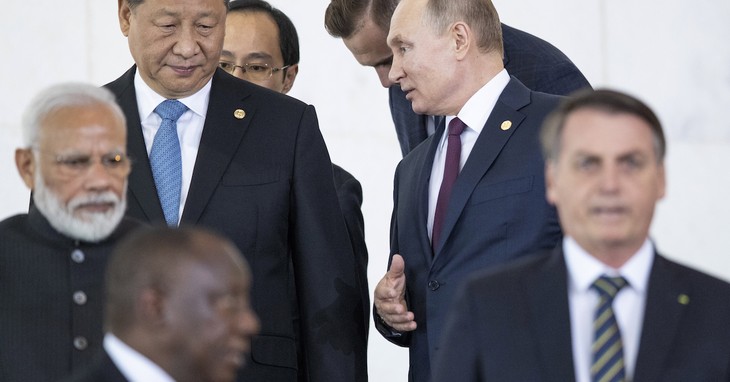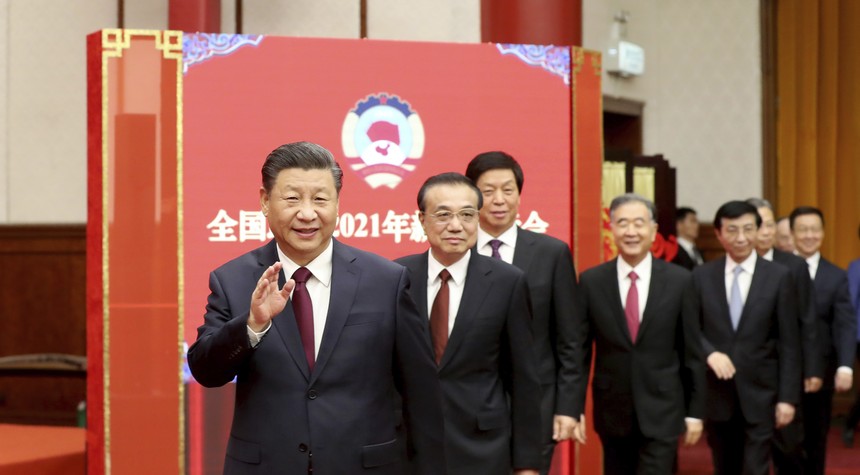Enter China, the World's New Global Leader (Thanks to Joe Biden)
While the focus of the weekend has been on the collapse of Silicon Valley Bank and the subsequent federal shutdown of it and New York’s Signature Bank, there has been a story bubbling under the surface about China’s growing influence in the Middle East.
As my colleague Susie Moore explained late last week, Iran and Saudi Arabia had been brought to the peace table for talks by the Chinese government, with both sides coming to an understanding. The proposal by the Chinese, which both sides seem to be agreeing to, is a return to normal relations between the two Middle Eastern countries. It wasn’t earth-shattering peace negotiations or anything like that, as the Saudis still view Iran as a destabilizing force in the region.
But, it’s clear that the Saudis have a little more peace of mind if a major global power like China was backing Iran and promising to help keep them in line.
Several media outlets reported on China’s growing influence in the region, with the New York Times all but gushing over it on Sunday.
When Beijing stepped into the role of mediator this week in the surprise rapprochement between Saudi Arabia and Iran, it signaled a new level of ambition for Xi Jinping, China’s top leader, who has sought to burnish his image as a global statesman in an escalating rivalry with the United States.
China’s top diplomat quickly attributed the success of four days of secret talks in reviving diplomatic ties between the two archrivals to Mr. Xi’s leadership, which he said demonstrated “the bearing of a great power.”
By taking credit for striking a peace deal in the Middle East, Mr. Xi is seizing on waning American influence in the region and presenting Chinese leadership as an alternative to a Washington-led order he depicts as driving the world toward a new cold war.
Xi was just elected to an unprecedented third term as President of China, marking the successful continuation of his reign and, as TIME notes, puts him on track for a lifetime tenure as leader of both the Chinese Communist Party and China as a whole.

The Chinese goal is clear – it wants to stop U.S. influence on the world stage and supplant it with its own influence. This is the same reason they are more comfortable now with cozying up to Russia while Vladimir Putin continues his invasion of Ukraine, even a year later. U.S. intelligence is keenly aware of this development and what it means for both Ukraine and western Europe.
Like China, Russia wants to push U.S. influence out and supplant it, and those two powers working in concert to do so may better succeed where just one can’t. But, why did China suddenly get so bold as to initiate Middle Eastern peace talks? Why are they now confident enough to sell weapons and other goods to Putin? Look no further than Washington D.C.’s foreign policy – or, perhaps, lack thereof.
Since the energy crisis of last summer, we’ve known that Saudi Arabia had no love (or respect) for the Biden administration. The animosity stems from Biden’s promise to treat the country as a “pariah” over the death of journalist Jamal Khashoggi. Biden refused to take calls from Saudi Crown Prince Mohammed bin Salman, angering the latter, who is the de facto leader of the country.
But, Biden also had to eat an embarrassing amount of crow over the summer as the energy crisis worsened, and was forced to meet with the Crown Prince to discuss OPEC+ oil output. Which, as it turned out, never really changed because Biden had done nothing to actually try to mend fences with the Saudis. He just made demands.
And the Saudis are constantly on edge over the Iranian regime and its growing power and recklessness. Such a regime is bad for stability, which in turn is bad for business. Since the U.S. seemed so eager to jump back into bed with the Iranians, the Saudis were even more unnerved. Enter China, who has brought both countries to the table in the U.S.’s absence.
It also takes barely a glance at the U.S.’s treatment of Russia and Vladimir Putin for the Chinese to realize that we will do next-to-nothing about their aggressive actions in Ukraine. While China condemned Putin’s invasion at first, they are now openly on Russia’s side and helping them in whatever way possible. Who is going to stand against them? The Biden administration?
Certainly not.
The Biden administration, in fact, believes the same thing the Obama administration believed: That the U.S. having a global presence is the destabilizing force in the world, and that we need to withdraw from the world stage for the world to heal. But there were four years in between Obama and Biden that proved that, actually, our presence on the world stage had the opposite effect.
Trump was particularly aggressive on the world stage, and while some have complained (perhaps even correctly) about the way he handled some of these larger foes (like Russia and China), you did not see Russia act on its claim over Ukraine while Trump was in office. You didn’t see China gearing up to invade Taiwan. You didn’t see the Iranians keep their promise of revenge after we obliterated one of their military leaders.
However, it was the Biden administration’s instantaneous withdrawal from global affairs the moment he came into office that has left a void that is being filled with violence and destabilization. The absence of the U.S. is allowing one of our biggest geopolitical threats (if not the biggest), China, to get a firmer foothold in global politics, and it only serves to hurt U.S. interests.
But, that’s what happens when you have a purely reactionary administration. They reacted by undoing everything Trump did on principle. They have been reacting to news stories ever since. They frequently seem to have no plan, and they’re always playing from behind. That’s not how foreign policy is supposed to work (hence why Biden’s isn’t working).





Post a Comment